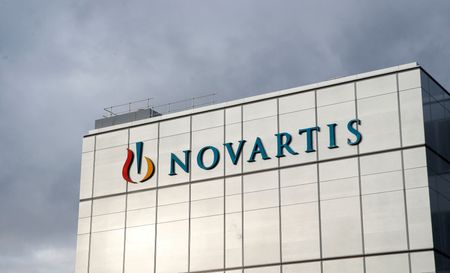By Ludwig Burger
(Reuters) -Novartis has agreed to acquire Seattle-based biotech firm Chinook Therapeutics for up to $3.5 billion to boost its late-stage drug development line-up with a new treatment for a rare severe kidney disease.
The transaction, in the form of a merger of a newly-formed Novartis unit and Chinook, is expected to close in the second half of 2023, the Swiss drugmaker said in a statement on Monday.
Under the agreement, Chinook shareholders would receive $3.2 billion, or $40 per share in cash, which represents a premium of 66.7% to Friday’s closing price. Chinook’s shares were trading at $40.1 premarket.
Shareholders would also receive a contingent value right worth up to $300 million, depending on certain regulatory achievements, Novartis said.
Novartis CEO Vas Narasimhan is eager to raise the prospect of future blockbuster drugs after leading a push to slash costs and reshape the drugmaker to focus on fewer therapeutic areas and the most promising geographic markets.
Narasimhan scored a major win this year when breast cancer drug Kisqali, one of two new drugs crucial to the group’s sales growth, was shown to help a wider patient group in a study.
The other drug hopeful is iptacopan, which is being trialled against a rare genetic blood disorder, possibly challenging AstraZeneca’s drugs Soliris and Ultomiris.
He has previously said he would look at a range of deal opportunities, but mainly assets worth less than $5 billion.
Chinook expects to report data from the late-stage study of its the experimental oral drug atrasentan to treat a kidney disease known as IgAN in the fourth quarter of this year.
It is also working on zigakibart, another experimental IgAN treatment that is injected, and plans to start a late-stage trial in the third quarter.
IgAN is a progressive autoimmune disease that mostly affects young adults and which can lead to dialysis or kidney transplantation. No targeted treatment options are available, Novartis said.
In the United States, IgAN affects up to 21 people per million per year, with a higher rate among Asian populations. IgAN is the most common cause of kidney failure in Caucasian young adults, it added.
The pharma major is set to become more dependent on its drug development fortunes as it plans to spin off its generic drugs division Sandoz in the second half of the year.
(Additional reporting by Miranda Murray and Mariam Sunny; Editing by Kim Coghill, Sonali Paul and Varun H K)

